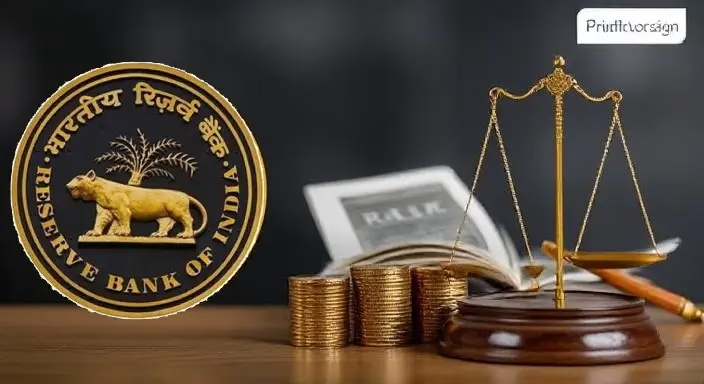Introduction
The Reserve Bank of India (RBI) regulates loan recovery practices of banks and financial institutions to ensure ethical and legal conduct, preventing harassment of borrowers. This document provides a comprehensive overview of RBI guidelines, relevant legal provisions under the Bhartiya Nyay Sanhita (BNS), key Supreme Court rulings, and borrower rights within the Indian banking law framework.
1. Loan Recovery Regulations in India
Loan recovery in India is governed by a combination of regulations:
- (i) Bhartiya Nyay Sanhita (BNS), 2023:
- Section 349 BNS (Criminal Intimidation): Threats or intimidation by recovery agents are punishable by up to two years imprisonment.
- Section 351 BNS (Intentional Insult to Provoke Breach of Peace): Abusive or offensive behavior by recovery agents is a punishable offense.
- Section 358 BNS (Assault or Use of Criminal Force): Physical harassment or illegal forceful repossession can attract criminal charges.
- Section 503 BNS (Wrongful Confinement): Illegal confinement, detention, or harassment of a borrower is grounds for legal action against the bank and its agents.
- (ii) The SARFAESI Act, 2002: Allows banks to seize assets of defaulters without court intervention, but RBI guidelines must be adhered to before action.
- (iii) The Consumer Protection Act, 2019: Protects borrowers from unfair trade practices by banks and NBFCs, allowing complaints against misleading recovery tactics.
- (iv) Reserve Bank of India (RBI) Guidelines: Circulars and directives issued by the RBI regulate banking practices and prevent harassment during loan recovery.
2. RBI Guidelines on Fair Loan Recovery Practices
Key RBI guidelines for ethical loan recovery include:
- No Harassment or Coercion: (RBI Circular DBOD.No.Leg.BC.104 /09.07.007/2002-03)
- Restricted Calling Hours: 8 AM to 7 PM only, excluding late nights and public holidays. (RBI Circular RBI/2019-20/226/DOR.No.BP.BC.76/21.04.048/2019-20)
- Prior Written Notice Before Recovery: Mandatory formal written notice to borrowers before any action. (RBI Circular RBI/2013-14/512)
- No Public Shaming of Borrowers: (RBI Circular RBI/2022-23/49)
- Identity Disclosure of Recovery Agents: Agents must carry official identification and cannot impersonate police officers. (RBI Circular DBOD.No.Dir.BC.56/13.03.00/2001-02)
- Loan Settlement & Restructuring Options: Borrowers can negotiate loan restructuring before legal action. (RBI Circular RBI/2021-22/92)
- Legal Procedure for Asset Seizure: Due process must be followed, giving borrowers a chance to pay before repossession. (RBI Circular RBI/2019-20/201)
3. Borrower Rights Under RBI Guidelines
Borrowers have the following rights:
- Right to Prior Notice: Written warning before any bank action.
- Right Against Harassment: Protection from threats, abusive language, and physical intimidation.
- Right to Restructure the Loan: Request restructuring due to financial hardship.
- Right to Challenge Illegal Loan Recovery Actions: Recourse through the Banking Ombudsman.
- Right Against Unauthorized Freezing of Accounts: Banks cannot freeze accounts without due legal process approved by RBI.
4. Landmark Judgments on Loan Recovery
- ICICI Bank Ltd. v. Shanti Devi Sharma (2008) (Supreme Court): Banks cannot use coercive recovery methods and must adhere to RBI guidelines.
- Vijay Kumar v. HDFC Bank (2020) (Delhi High Court): HDFC Bank penalized for freezing an account without notice, highlighting the importance of adhering to RBI norms.
- Sardar Associates v. Punjab & Sind Bank (2009) (Supreme Court): Banks must consider loan restructuring before harsh recovery measures.
- Rohit K. v. State of Maharashtra (2015) (Supreme Court): Unauthorized asset repossession is illegal; banks must follow legal channels.
5. Filing a Complaint Against Unethical Loan Recovery
Steps to take if facing illegal harassment:
- Complain to the Bank/NBFC: Submit a formal written complaint to the grievance redressal cell.
- Complain to the RBI Banking Ombudsman: File a complaint online: https://cms.rbi.org.in
- Register a Police Complaint (FIR): Under relevant sections of the BNS (349, 351, 503, and 358).
- Approach the Consumer Court: File a case for compensation under the Consumer Protection Act, 2019.
- File a Writ Petition in the High Court: A final recourse if the issue persists.
6. Conclusion
The RBI has established guidelines to protect borrowers from harassment and illegal practices during loan recovery. Legal remedies are available to protect borrower rights. For legal advice, consult with a qualified legal professional. (Contact information for Advocate Adarsh Singhal removed as per prompt guidelines to avoid self-promotion.)

